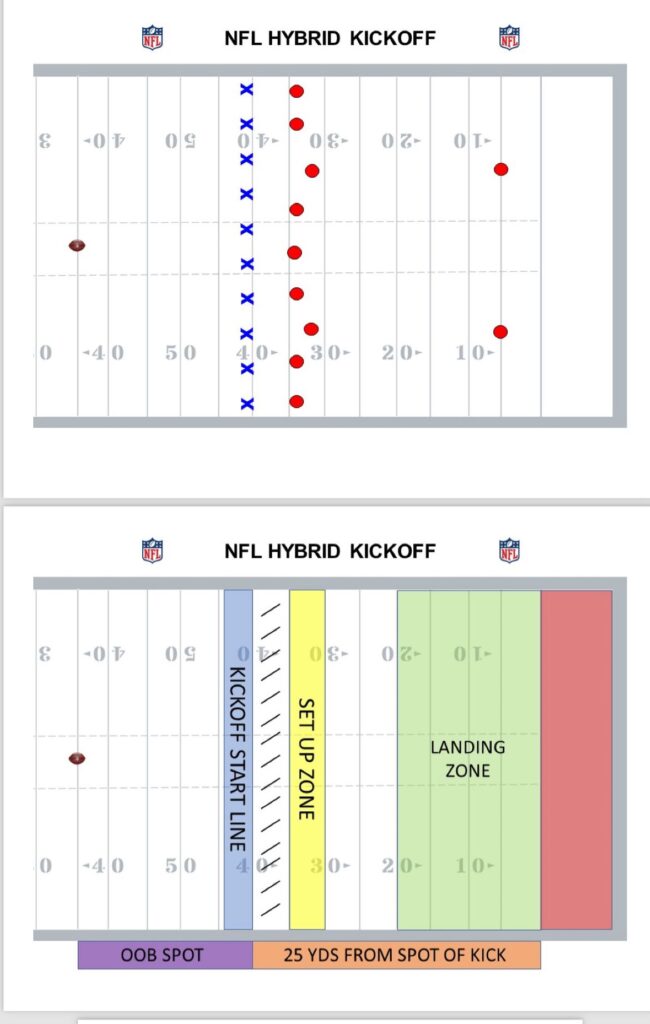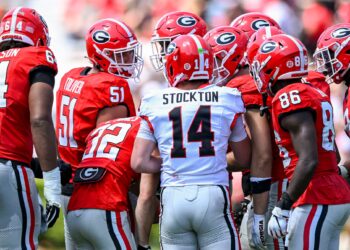The NFL has completely revamped the way that kickoffs will work starting in the 2024 season, and Green Bay Packers kick return specialist Keisean Nixon couldn’t be more amped.
Nixon, who also serves as the nickel cornerback for the Packers, has received All-Pro honors as a return specialist in each of the last two seasons. He says he’s excited to try for a third All-Pro, and that this time it may be even easier for him due to the increased likelihood of the receiving team fielding kick returns. “Last year… I should have had more returns but I’ve gotta force it. So, now I don’t have to force it, it’s gonna be common,” Nixon told reporters on Tuesday.
The Kick Return Rule Changes:
So what exactly will kickoffs look like now? We don’t have a perfect idea, Nixon himself said that even coaches are still trying to figure out how to coach it and refs may even still be figuring out how to enforce certain aspects on the field, but I’ll explain as clearly as I can. A full list of rules can be found on the NFL’s website.

Alignment:
To start, the ball is still kicked off from the 35 yard line, that has not changed. The 10 other (non-kicker) players on the kicking team will line up on the receiving team’s 40 yard line, meaning they will start off much closer to where the ball will be kicked off to. The kicker will not be allowed to move past the 50 yard line until the ball lands, and the rest of the kicking team will not be allowed to move at all from the 40 yard line until the ball lands.
The ball will be deemed as having “landed” once it touches a returner or the ground in between the 20 yard line and the back of the end zone.
If a penalty preceding a kickoff affects the placement of a kickoff, the alignment will remain the same, with only the kickoff spot being changed.
It should also be noted that onside kicks will be aligned in the normal way we’re all used to, but they must be declared, and they can only be attempted in the 4th quarter of a contest and they can only be attempted by the trailing team.
Just in front of this 10 man front will be the “setup zone” for the receiving team, where at least 9 members of the receiving team will be required to set up between the 30 and the 35. These 9 players will also not be permitted to move until the ball lands. There will be an allowance of up to two returners in what will be known as the “landing zone” (the area between the front of the end zone and the receiving team’s 20 yard line). These returners will be allowed to move freely at any time before or during the kick.
Landing Zone Rules:
If the ball lands short of the landing zone it is immediately blown dead and is treated like a kickoff out of bounds, and the offense will start at the 40, and if the ball lands anywhere within the landing zone it must be returned.
If the ball lands in the landing zone and then rolls into the end zone it can either be returned or downed by a member of the receiving team in order to force a touchback that will put the offense on the 20 yard line.
However, if the ball lands directly in the end zone and is downed in the end zone it will be a touchback and the ball will be placed on the 30 for the offense.
If the ball goes out of the back of the end zone it will be a touchback and the ball will also be placed at the 30 for the offense.
How Will These Kick Return Rules Impact Strategy?
These rules are in place to try make kickoffs more interesting to watch while also increasing player safety. Kicking teams will be less likely to kick a ball deep into the end zone, because they’ll likely want to avoid 30 yard touchbacks. This, in theory, means we will see a lot more kickoffs being returned by the receiving team.
With less room between the kicking and receiving teams, there will be less “ramp up” room for kick coverage players and blockers on the receiving team to build up speed and bash into each other.
The main point here is that kickers will be trying to land the ball as close to the 1 yard line as possible without entering the end zone, meaning that an All-Pro kick returner like Keisean Nixon should be excited to get a lot more opportunities to return kicks.
Back in March around the time this rule change was first proposed, he posted on X (formerly Twitter) and showed some excitement for the possibility, and alluded to what would happen. I’ll just let him speak to that:
lol Go Ahead And Approve That KR Rule And Ima Go Back to Back to Back…. #K9
— K9 (@keiseannixon) March 20, 2024











Discussion about this post